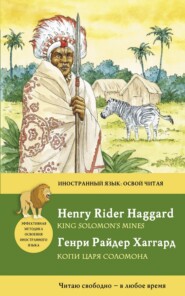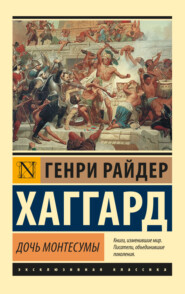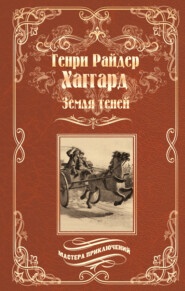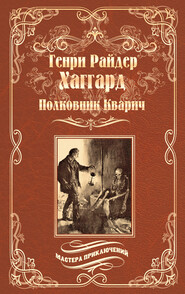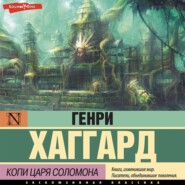По всем вопросам обращайтесь на: info@litportal.ru
(©) 2003-2024.
✖
Ayesha: The Return of She
Автор
Серия
Год написания книги
1905
Настройки чтения
Размер шрифта
Высота строк
Поля
We plunged upwards through the snow slope, dragging the yak with us, to the terrace whereon the monastery was built. Nobody seemed to be about there, nor could I discern any footprints. Was the place but a ruin? We had found many such; indeed this ancient land is full of buildings that had once served as the homes of men, learned and pious enough after their own fashion, who lived and died hundreds, or even thousands, of years ago, long before our Western civilization came into being.
My heart, also my stomach, which was starving, sank at the thought, but while I gazed doubtfully, a little coil of blue smoke sprang from a chimney, and never, I think, did I see a more joyful sight. In the centre of the edifice was a large building, evidently the temple, but nearer to us I saw a small door, almost above which the smoke appeared. To this door I went and knocked, calling aloud —
“Open! open, holy Lamas. Strangers seek your charity.” After awhile there was a sound of shuffling feet and the door creaked upon its hinges, revealing an old, old man, clad in tattered, yellow garments.
“Who is it? Who is it?” he exclaimed, blinking at me through a pair of horn spectacles. “Who comes to disturb our solitude, the solitude of the holy Lamas of the Mountains?”
“Travellers, Sacred One, who have had enough of solitude,” I answered in his own dialect, with which I was well acquainted. “Travellers who are starving and who ask your charity, which,” I added, “by the Rule you cannot refuse.”
He stared at us through his horn spectacles, and, able to make nothing of our faces, let his glance fall to our garments which were as ragged as his own, and of much the same pattern. Indeed, they were those of Tibetan monks, including a kind of quilted petticoat and an outer vestment not unlike an Eastern burnous. We had adopted them because we had no others. Also they protected us from the rigours of the climate and from remark, had there been any to remark upon them.
“Are you Lamas?” he asked doubtfully, “and if so, of what monastery?”
“Lamas sure enough,” I answered, “who belong to a monastery called the World, where, alas! one grows hungry.”
The reply seemed to please him, for he chuckled a little, then shook his head, saying —
“It is against our custom to admit strangers unless they be of our own faith, which I am sure you are not.”
“And much more is it against your Rule, holy Khubilghan,” for so these abbots are entitled, “to suffer strangers to starve”; and I quoted a well-known passage from the sayings of Buddha which fitted the point precisely.
“I perceive that you are instructed in the Books,” he exclaimed with wonder on his yellow, wrinkled face, “and to such we cannot refuse shelter. Come in, brethren of the monastery called the World. But stay, there is the yak, who also has claims upon our charity,” and, turning, he struck upon a gong or bell which hung within the door.
At the sound another man appeared, more wrinkled and to all appearance older than the first, who stared at us open-mouthed.
“Brother,” said the abbot, “shut that great mouth of yours lest an evil spirit should fly down it; take this poor yak and give it fodder with the other cattle.”
So we unstrapped our belongings from the back of the beast, and the old fellow whose grandiloquent title was “Master of the Herds,” led it away.
When it had gone, not too willingly – for our faithful friend disliked parting from us and distrusted this new guide – the abbot, who was named Kou-en, led us into the living room or rather the kitchen of the monastery, for it served both purposes. Here we found the rest of the monks, about twelve in all, gathered round the fire of which we had seen the smoke, and engaged, one of them in preparing the morning meal, and the rest in warming themselves.
They were all old men; the youngest could not have been less than sixty-five. To these we were solemnly introduced as “Brethren of the Monastery called the World, where folk grow hungry,” for the abbot Kou-en could not make up his mind to part from this little joke.
They stared at us, they rubbed their thin hands, they bowed and wished us well and evidently were delighted at our arrival. This was not strange, however, seeing that ours were the first new faces which they had seen for four long years.
Nor did they stop at words, for while they made water hot for us to wash in, two of them went to prepare a room – and others drew off our rough hide boots and thick outer garments and brought us slippers for our feet. Then they led us to the guest chamber, which they informed us was a “propitious place,” for once it had been slept in by a noted saint. Here a fire was lit, and, wonder of wonders! clean garments, including linen, all of them ancient and faded, but of good quality, were brought for us to put on.
So we washed – yes, actually washed all over – and having arrayed ourselves in the robes, which were somewhat small for Leo, struck the bell that hung in the room and were conducted by a monk who answered it, back to the kitchen, where the meal was now served. It consisted of a kind of porridge, to which was added new milk brought in by the “Master of the Herds,” dried fish from a lake, and buttered tea, the last two luxuries produced in our special honour. Never had food tasted more delicious to us, and, I may add, never did we eat more. Indeed, at last I was obliged to request Leo to stop, for I saw the monks staring at him and heard the old abbot chuckling to himself.
“Oho! The Monastery of the World, where folk grow hungry,” to which another monk, who was called the “Master of the Provisions,” replied uneasily, that if we went on like this, their store of food would scarcely last the winter. So we finished at length, feeling, as some book of maxims which I can remember in my youth said all polite people should do – that we could eat more, and much impressed our hosts by chanting a long Buddhist grace.
“Their feet are in the Path! Their feet are in the Path!” they said, astonished.
“Yes,” replied Leo, “they have been in it for sixteen years of our present incarnation. But we are only beginners, for you, holy Ones, know how star-high, how ocean-wide and how desert-long is that path. Indeed it is to be instructed as to the right way of walking therein that we have been miraculously directed by a dream to seek you out, as the most pious, the most saintly and the most learned of all the Lamas in these parts.”
“Yes, certainly we are that,” answered the abbot Kou-en, “seeing that there is no other monastery within five months’ journey,” and again he chuckled, “though, alas!” he added with a pathetic little sigh, “our numbers grow few.”
After this we asked leave to retire to our chamber in order to rest, and there, upon very good imitations of beds, we slept solidly for four and twenty hours, rising at last perfectly refreshed and well.
Such was our introduction to the Monastery of the Mountains – for it had no other name – where we were destined to spend the next six months of our lives. Within a few days – for they were not long in giving us their complete confidence – those good-hearted and simple old monks told us all their history.
It seemed that of old time there was a Lamasery here, in which dwelt several hundred brethren. This, indeed, was obviously true, for the place was enormous, although for the most part ruined, and, as the weather-worn statue of Buddha showed, very ancient. The story ran, according to the old abbot, that two centuries or so before, the monks had been killed out by some fierce tribe who lived beyond the desert and across the distant mountains, which tribe were heretics and worshippers of fire. Only a few of them escaped to bring the sad news to other communities, and for five generations no attempt was made to reoccupy the place.
At length it was revealed to him, our friend Kou-en, when a young man, that he was a re-incarnation of one of the old monks of this monastery, who also was named Kou-en, and that it was his duty during his present life to return thither, as by so doing he would win much merit and receive many wonderful revelations. So he gathered a band of zealots and, with the blessing and consent of his superiors, they started out, and after many hardships and losses found and took possession of the place, repairing it sufficiently for their needs.
This happened about fifty years before, and here they had dwelt ever since, only communicating occasionally with the outside world. At first their numbers were recruited from time to time by new brethren, but at length these ceased to come, with the result that the community was dying out.
“And what then?” I asked.
“And then,” the abbot answered, “nothing. We have acquired much merit; we have been blest with many revelations, and, after the repose we have earned in Devachan, our lots in future existences will be easier. What more can we ask or desire, removed as we are from all the temptations of the world?”
For the rest, in the intervals of their endless prayers, and still more endless contemplations, they were husbandmen, cultivating the soil, which was fertile at the foot of the mountain, and tending their herd of yaks. Thus they wore away their blameless lives until at last they died of old age, and, as they believed – and who shall say that they were wrong – the eternal round repeated itself elsewhere.
Immediately after, indeed on the very day of our arrival at the monastery the winter began in earnest with bitter cold and snowstorms so heavy and frequent that all the desert was covered deep. Very soon it became obvious to us that here we must stay until the spring, since to attempt to move in any direction would be to perish. With some misgivings we explained this to the abbot Kou-en, offering to remove to one of the empty rooms in the ruined part of the building, supporting ourselves with fish that we could catch by cutting a hole in the ice of the lake above the monastery, and if we were able to find any, on game, which we might trap or shoot in the scrub-like forest of stunted pines and junipers that grew around its border. But he would listen to no such thing. We had been sent to be their guests, he said, and their guests we should remain for so long as might be convenient to us. Would we lay upon them the burden of the sin of inhospitality? Besides, he remarked with his chuckle —
“We who dwell alone like to hear about that other great monastery called the World, where the monks are not so favoured as we who are set in this blessed situation, and where folk even go hungry in body, and,” he added, “in soul.”
Indeed, as we soon found out, the dear old man’s object was to keep our feet in the Path until we reached the goal of Truth, or, in other words, became excellent Lamas like himself and his flock.
So we walked in the Path, as we had done in many another Lamasery, and assisted at the long prayers in the ruined temple and studied the Kandjur, or “Translation of the Words” of Buddha, which is their bible and a very long one, and generally showed that our “minds were open.” Also we expounded to them the doctrines of our own faith, and greatly delighted were they to find so many points of similarity between it and theirs. Indeed, I am not certain but that if we could have stopped there long enough, say ten years, we might have persuaded some of them to accept a new revelation of which we were the prophets. Further, in spare hours we told them many tales of “the Monastery called the World,” and it was really delightful, and in a sense piteous, to see the joy with which they listened to these stories of wondrous countries and new races of men; they who knew only of Russia and China and some semi-savage tribes, inhabitants of the mountains and the deserts.
“It is right for us to learn all this,” they declared, “for, who knows, perhaps in future incarnations we may become inhabitants of these places.”
But though the time passed thus in comfort and indeed, compared to many of our experiences, in luxury, oh! our hearts were hungry, for in them burned the consuming fire of our quest. We felt that we were on the threshold – yes, we knew it, we knew it, and yet our wretched physical limitations made it impossible for us to advance by a single step. On the desert beneath fell the snow, moreover great winds arose suddenly that drove those snows like dust, piling them in heaps as high as trees, beneath which any unfortunate traveller would be buried. Here we must wait, there was nothing else to be done.
One alleviation we found, and only one. In a ruined room of the monastery was a library of many volumes, placed there, doubtless, by the monks who were massacred in times bygone. These had been more or less cared for and rearranged by their successors, who gave us liberty to examine them as often as we pleased. Truly it was a strange collection, and I should imagine of priceless value, for among them were to be found Buddhistic, Sivaistic and Shamanistic writings that we had never before seen or heard of, together with the lives of a multitude of Bodhisatvas, or distinguished saints, written in various tongues, some of which we did not understand.
What proved more interesting to us, however, was a diary in many tomes that for generations had been kept by the Khubilghans or abbots of the old Lamasery, in which every event of importance was recorded in great detail. Turning over the pages of one of the last volumes of this diary, written apparently about two hundred and fifty years earlier, and shortly before the destruction of the monastery, we came upon an entry of which the following – for I can only quote from memory – is the substance —
“In the summer of this year, after a very great sandstorm, a brother (the name was given, but I forget it) found in the desert a man of the people who dwell beyond the Far Mountains, of whom rumours have reached this Lamasery from time to time. He was living, but beside him were the bodies of two of his companions who had been overwhelmed by sand and thirst. He was very fierce looking. He refused to say how he came into the desert, telling us only that he had followed the road known to the ancients before communication between his people and the outer world ceased. We gathered, however, that his brethren with whom he fled had committed some crime for which they had been condemned to die, and that he had accompanied them in their flight. He told us that there was a fine country beyond the mountains, fertile, but plagued with droughts and earthquakes, which latter, indeed, we often feel here.
“The people of that country were, he said, warlike and very numerous but followed agriculture. They had always lived there, though ruled by Khans who were descendants of the Greek king called Alexander, who conquered much country to the south-west of us. This may be true, as our records tell us that about two thousand years ago an army sent by that invader penetrated to these parts, though of his being with them nothing is said.
“The stranger-man told us also that his people worship a priestess called Hes or the Hesea, who is said to reign from generation to generation. She lives in a great mountain, apart, and is feared and adored by all, but is not the queen of the country, in the government of which she seldom interferes. To her, however, sacrifices are offered, and he who incurs her vengeance dies, so that even the chiefs of that land are afraid of her. Still their subjects often fight, for they hate each other.
“We answered that he lied when he said that this woman was immortal – for that was what we supposed he meant – since nothing is immortal; also we laughed at his tale of her power. This made the man very angry. Indeed he declared that our Buddha was not so strong as this priestess, and that she would show it by being avenged upon us.
“After this we gave him food and turned him out of the Lamasery, and he went, saying that when he returned we should learn who spoke the truth. We do not know what became of him, and he refused to reveal to us the road to his country, which lies beyond the desert and the Far Mountains. We think that perhaps he was an evil spirit sent to frighten us, in which he did not succeed.”
Such is a precis of this strange entry, the discovery of which, vague as it was, thrilled us with hope and excitement. Nothing more appeared about the man or his country, but within a little over a year from that date the diary of the abbot came to a sudden end without any indication that unusual events had occured or were expected.
Indeed, the last item written in the parchment book mentioned the preparation of certain new lands to be used for the sowing of grain in future seasons, which suggested that the brethren neither feared nor expected disturbance. We wondered whether the man from beyond the mountains was as good as his word and had brought down the vengeance of that priestess called the Hesea upon the community which sheltered him. Also we wondered – ah! how we wondered – who and what this Hesea might be.
On the day following this discovery we prayed the abbot, Kou-en, to accompany us to the library, and having read him the passage, asked if he knew anything of the matter. He swayed his wise old head, which always reminded me of that of a tortoise, and answered —
“A little. Very little, and that mostly about the army of the Greek king who is mentioned in the writing.”
We inquired what he could possibly know of this matter, whereon Kou-en replied calmly —






